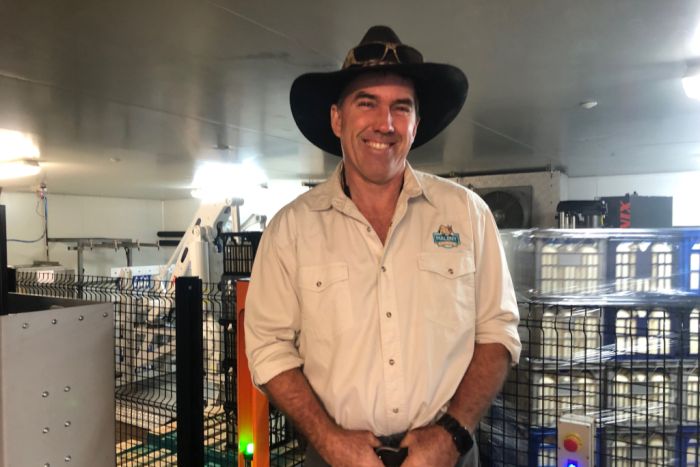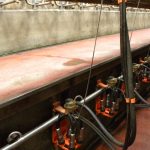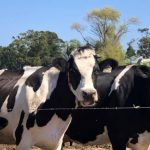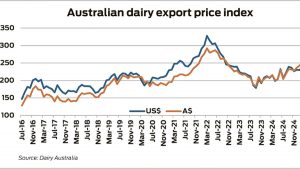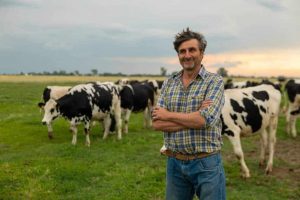
In the past five years Ross and Sally Hopper have spent about $10 million upgrading Maleny Dairies’ factory.
It was founded in 2000 by Mr Hopper’s late parents Harold and Dorothy — dairy farmers who foresaw the difficulties ahead after deregulation.
At the turn of the century there were 1,500 dairy farms in Queensland; now there are about 300.
Heavy lifting
The Hoppers’ most recent $2.5 million investment included installing two crate-stacking robots to cut down on spiralling casual overtime costs and speed up deliveries to their distribution centres at Caboolture and the Gold Coast, and to IGA’s major depot in Brisbane.
“We’re looking forward to the future, we can see a future in our domestic milk and yeah automation is obviously a way of moving forward,” Mr Hopper said.
“We’ve got to look after our farmers but we’re trying to get in a position to be stable and get the right price to them.”
Farmers first
Eleven local farms supply Maleny Dairies which employs 50 staff and produces a range of milk, yoghurt, custard and cream products.
The company’s creamy guernsey milk — a finalist in the 2020 Grand Dairy awards — is in the running to be named most popular in the country for three consecutive years.
But general manager Peter Falcongreen was frank about finances.
He said the Hoppers have prioritised increasing payments to struggling farmers over their own profits.
“We’re hurting, there is no getting around it, as as a company Maleny Dairies is hurting,” he said.
“We’ve set ourselves up to be able to to be robust but this is not a good period of time for us.
“Every cent that we’ve got we’ve just ploughed back into the business, that’s the only way we can move forward.”
After five years of holding prices the company has flagged a 12-cents-per-litre price rise for its milk from March next year.
Mr Falcongreen said Maleny Dairies had already significantly raised the price it was paying to its farmers to an average of 71 cents per litre.
“We’ve already pre-paid the farmers 4 cents of the 12 cents,” Mr Falcongreen said.
“Our family farms right now have just said ‘We can’t continue’, so we’ve propped that up.
“Of the 12 cents, 8 cents is going to the farmer and this price rise is just to cover costs it’s still not a farmer making any profit.”
Price rise needed: Dairy farmer
Kenilworth dairy farmer Shane Paulger swapped contracts to Maleny Dairies in July last year and warned that Queensland’s dairy industry was in jeopardy of total collapse because of the drought.
He said the price rise was warranted.
“They need to do that otherwise we won’t be around,” he said.
“They’re a good company to deal with, they’re local, they tick all the boxes for us.
“They’ve always paid a price that is certainly right up there, having said that we are struggling with dry weather.
“It’s driving our prices through the roof, we’re bringing hay in from South Australia and grain in from Western Australia.”
Dairy downturn
Mr Falcongreen said media reports were not exaggerating or embellishing the prohibitive costs faced by farmers.
“With grain at $600 a tonne, input costs, water, fuel and as a business we have got the same increasing electricity and fuel costs,” he added.
“We’re part of the statistic of not being able to give good wage increases to our staff because we just don’t have the money.”
Appeal to consumers
Mr Falcongreen said he hoped supermarket chains would accept the need for a price rise and continue supporting Queensland-made products by providing more space for branded milk on their shelves as opposed to discount milk.
“Then if they do accept it, they’re going to put their money on top, so if we put on 12 cents a litre, I don’t know what they’re going to sell it for, that’s entirely up to them.
“People think we set the price in the shop — and we don’t.”
He appealed to consumers to boycott discount milk.
“If you want local dairy farms, if you want fresh milk of any sort, you just have to start buying branded milk.”
